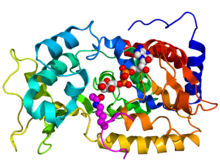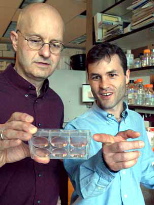What Does Sirt1 Mean
 SIRT1,
(Silent Information Regulator Two (Sir2) or sirtuins are proteins
argued to be responsible for delivering anti-aging attributes by
altering a the length of a cells life span.
SIRT1,
(Silent Information Regulator Two (Sir2) or sirtuins are proteins
argued to be responsible for delivering anti-aging attributes by
altering a the length of a cells life span.
Researchers at MIT
first discovered the effect the SIRT1 gene had on mammalian fat cells
when short term receptors which detect famine were turned on,
therefore initiating fat cells normally store fat, to metabolize or
shred fat.
MIT Professor of Biology Leonard Guarente, who has
been studying the aging process in yeast, roundworms and mice for more
than a decade suggests that ...."For the first time, this study gives
us a glimpse of how calorie restriction works at the molecular level.
And it will ultimately lead to health benefits in people, no doubt about
that".
Professor Leonard Guarente writes that this happens
because the "Sirt1 protein activates a critical component of calorie
restriction in mammals; that is, fat mobilization in white adipocytes.
When hunger strikes the Sirt1 protein binds to and represses the genes
that are controlled by PPAR- gamma, the fat regulator," therefore
stopping fat from being stored in the body.
Guarente argues
that ..."The ability of fat cells to sense short- term hunger and
release the fat is regulated by this gene. We like to think this applies
to people as well as mice, but we don't know for sure". Scientists
state that if they could make this happen in humans, it wouldn't just
make them live longer; it might also help prevent diseases of aging,
like cancer, diabetes and heart disease.
A mammal generally burns the protein and carbohydrates in its food
almost immediately; where it stores fat in special cells called white
adipose tissue (WAT). When it reduces its caloric intake, the WAT
stops storing fat and begins releasing it for metabolism.
Because WAT also makes hormones, notably leptin which controls
satiety, Professor Guarente speculates that by putting hormones into the
bloodstream, fat cells will also tell the body how fast to age.
Scientists know already fat or lack of it has vast implications in the
lives of people, but by putting them on an austere diet like tests
carried out on rodents, just isn't feasible. Dieting like animals
undergo would mean cutting your calorie restriction by half, there it
would be like eating once every two days.
However, Guarantee
suggests if scientists could make a drug that would bind to Sirt1 and
fool the body into thinking that it needed to release that fat, then
maybe people could get the benefits of calorie restriction without the
side effects,which is why both resveratrol and acai manufacturers believe they both offer a sort of fountain-of-youth drug as they both present with SIRT1 proteins.


